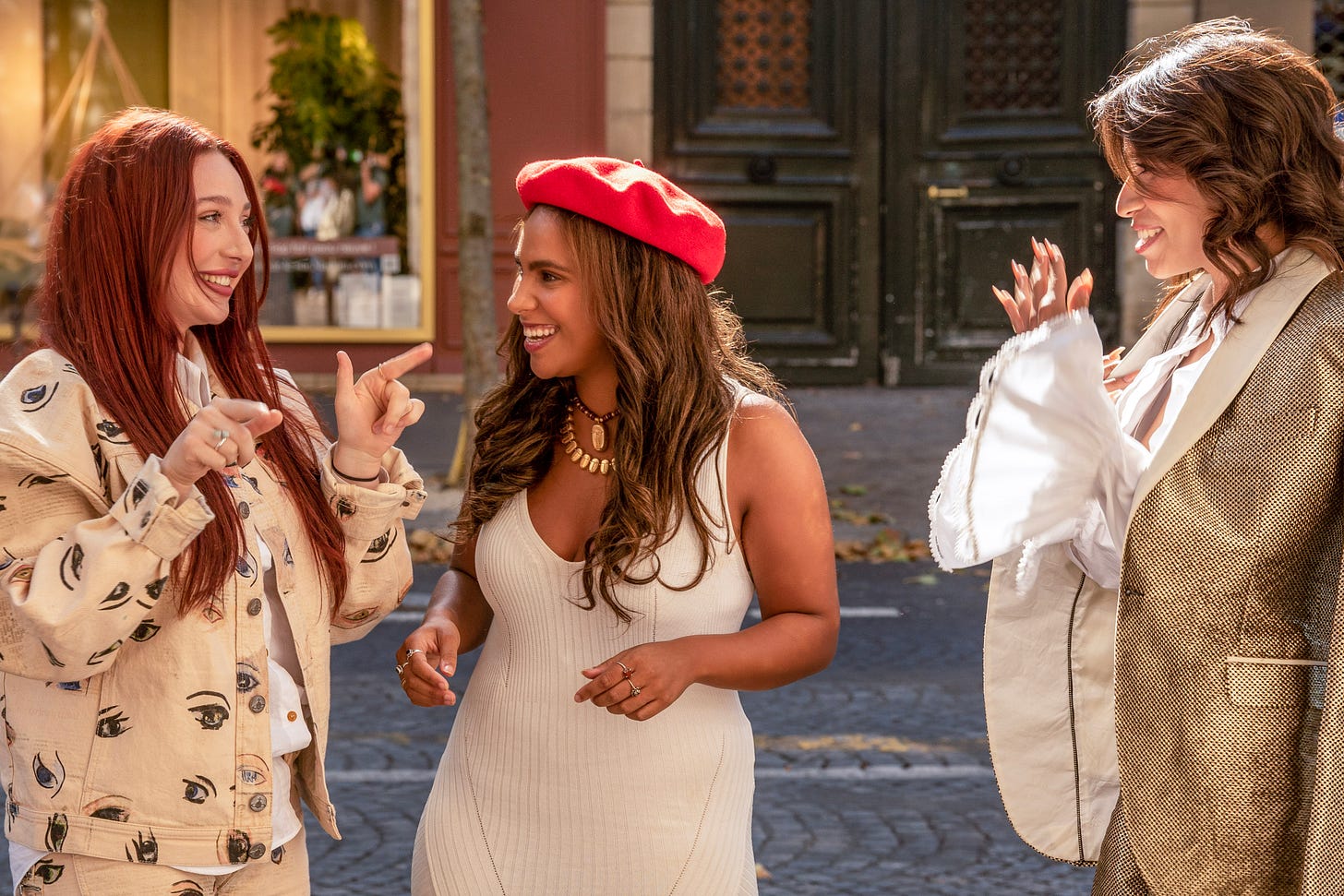I have never seen a dating show like "Love Trip: Paris."
The series follows Rose, Josielyn, Lacy, and Caroline, American women trying to find love in Paris.
I love many things about "Love Trip: Paris," the Freeform show following francophiles Rose Zilla-Ba, Josielyn Aguilera, Lacy Hartselle, and Caroline Renner, four American women trying to find love in Paris.
The weekly show premiered on Valentine's Day, and its first four episodes are currently streaming on Hulu. The women live in a gorgeous apartment complex called le tronchet, along with their suitors. In every episode, they invite one of the women or men on a date throughout Paris, and we see the women go on scenic dates throughout the city. It's a gorgeous show, from the Parisian dates to the outfits the women, especially Josielyn, wear in every episode.
Josielyn is really the show.
Josielyn is my favorite. (Though all the women are lovable. A dating series first for me.) She's 26 and honest about never being in love or in a relationship before. She is open about her journey as a trans woman who grew up in Mexico, describing her post-op journey in the first episode. She's strong and trusts her gut when a suitor proves to be gaslighting her.
I love how endearing and open she is and how supportive the other women are of her.

In episode two, Josielyn calls out one of her suitors. "I felt like you invalidated my sexuality, that you attacked who I am. And I just felt unsafe. That really broke my heart. And I know that I'm an amazing queer woman, and I don't want anyone to make me feel otherwise or invalidate who I am," she tells her. When the suitor responds and claims she is the only one to truly see her for who she is, Rose pushes back and affirms the women's support for Josielyn. The women are genuine friends and listen to each other without interruption or judgment.
They often talk about therapy, how important it is for men, and growing for themselves. Even though they are on a dating series, and they are expected to overlap in suitors, they still check in when one is interested in the other's suitors. They are not female characters who turn against each other to further some dramatic plot. And there are still really awkward, tense love triangle moments you won't be able to turn away from. The women also talk their way through these. It's genuinely fascinating to watch.
This is still a show created under the Disney TV empire; Freeform is "Walt Disney Television's young adult television network." It is a show created for profit and consumption, and reality tv is still very scripted and mediated—we never see entirely what happens or how it happens. People and teams are behind what we see. And we cannot ignore the relationship between what we see onscreen and what terrifyingly precise algorithms-created-by-billion-dollar tech companies feed us on our phone screens.
Yet the show lacks the emptiness, claustrophobia, or cisgender heteronormativity of dating series like "Love is Blind" or "Too Hot to Handle." Almost all the women are queer, and one of the suitors opens up about his own gender fluidity and the role it plays in his rap music.
Caroline described to Teen Vogue's P. Claire Dodson how important it was that Freeform created such an inclusive space for the four women. "Being a part of the queer community is a community that transcends language. Because whether or not I can speak a lick of the language that you grew up speaking, we can understand each other on some level. And there's connection there, and there's safety there, and there's community."


"Love Trip: Paris" features two women of color pursuing various love interests, showing two white women creating space for them both. The series treats accountability and therapy respectfully. It feels inclusive, fresh, charming, and powerful, especially when fascists and the mainstream institutions that uplift them continue their transphobic rhetoric and legislation. Especially when this leads to a rise in violence against trans women, children, and men.
Writing for The Nation about her decision to sign a letter condemning The New York Times for its transphobia, journalist and culture writer Hanna Phifer writes that mainstream media publish "narratives that put the lives of trans people in danger," narratives based upon "the suggestion that marginalized communities have more systemic power than they actually do." Phifer adds: "The right weaponizes fears of the state's losing control over an increasingly conscious population to ban ‘critical race theory’ from classrooms, to defund reproductive health care clinics and restrict abortions, and to accelerate transphobia—it's all connected."
I read Phifer after I finished episode four.
I am thinking a lot about the role of art during these times. I love that "Love Trip: Paris" pushes against mainstream media and art. It beautifully and authentically centers on a trans woman, her vulnerability, her relationship with love and romantic interests, and her friendships.
In Dodson's interview, Josielyn stated, "I learned so much about me and about knowing my own worth and my own value and always having that first. Making sure that I love who I am and I value everything that I've accomplished. I feel like that's going to take me into loving and appreciating someone else."
ICYMI: Last week I wrote about Beyond Survival: Strategies and Stories from the Transformative Justice Movement and how it informed my “Real Housewives of Atlanta” binge.






